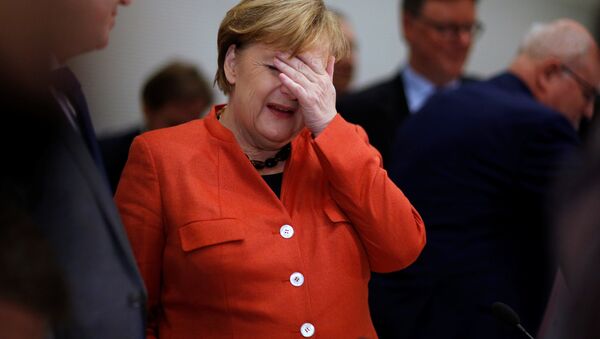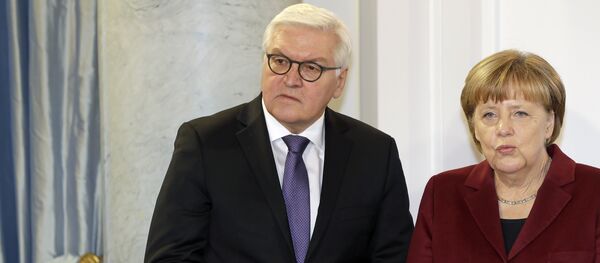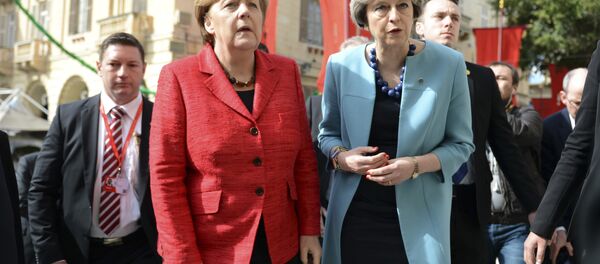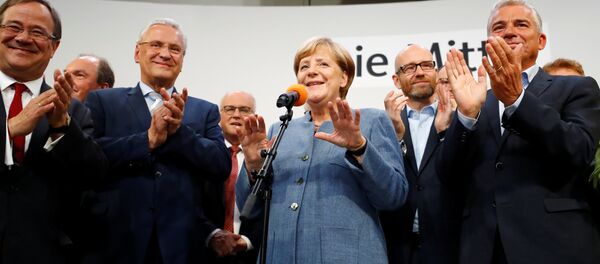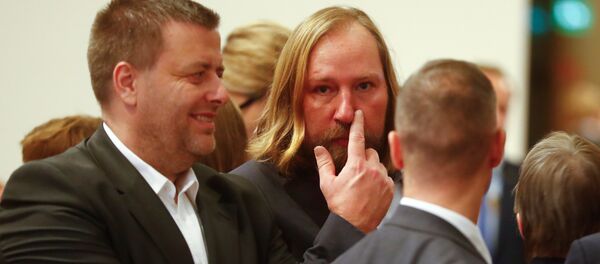BERLIN (Sputnik) — Late on Sunday, the FDP announced its withdrawal from the coalition negotiations with the ruling block of the Christian Democratic Union (CDU) and its Bavarian sister party the Christian Social Union (CSU) and the Greens. The coalition, if created, would have 393 of 709 seats in the parliament (55 percent of the total number of seats), while now CDU/SCU and the Greens only have 44 percent of seats.
Following the breakdown of coalition talks, Germany might form a minority government for the first time in Germany's history or to call a new election, which would set a new record as a new election has never been called this fast so far.
Merkel Responsible For Absense of Common Ideas
Christian Lindner, the FDP chairman, told reporters that the parties that were engaged in the coalition talks, had not managed to find common ideas.
"We held these talks to explore the situation, but not to form the government. Such preliminary talks should end up with a decision whether the parties managed to build mutual trust, whether common ideas appeared, and exactly these common ideas concerning the country's governance did not appear," Lindner said.
"The negotiations were chaotic from the very beginning. They were unstructured, disorganized. The chancellor did not find a solution to the conflict. In contrast, everything was postponed, constantly postponed further. So Angela Merkel is to blame," Wissing told the Deutschlandfunk radio station in an interview.
The politician explained that over the past week, the talks were getting more and more difficult until becoming "fully stuck" on Thursday.
"Day by day, Merkel was pushing aside the issues of migration and European politics, hoping that things will resolve on their own," Wissing stressed.
Greens Ready to Pursue Dialogue
The Greens party, in its turn, is ready to continue the negotiations on the new government formation, the party's parliamentary group co-chair and one of the party’s leaders, Anton Hofreiter said.
"If there are other negotiations, we will be ready for it," Hofreiter told reporters.
Hofreiter added the talks about whether Germany would hold a new election or form a minority government were speculations.
"If there are new elections, we will run in these elections with our ideas, if there are new ideas – we should see whether it is reasonable, the Greens are ready for negotiations at any moment," Hofreiter indicated.
SPD Advocates New Election, AFD Supports Merkel's Resignation
The German Social Democratic Party (SPD), which has gone to opposition, following the German parliamentary election, has reiterated once again that it was not ready to join the coalition and was not afraid of a new election.
"We still do not fear new election. In the light of the results of September 24 election we are not ready to join the ‘big coalition,’" SPD chairman Martin Schulz said.
"Mrs. Merkel has failed, and the time has come for her to leave the chancellor's post," Alexander Gauland, the AfD leader, said.
Gauland expressed his satisfaction with the fact that the coalition had not been created as such a configuration of the government would not reflect public consensus.
Alice Weidel, another AfD leader, in her turn, explained that the negotiations had been doomed for failure from the early beginning, while lengthy consultations were misleading German voters.
President Calls For Forming Government
German President Frank-Walter Steinmeier stated following a meeting with Merkel that he expected that all the parties should form the government based on the results of the election that took place on September 24.
"Preliminary talks on the formation of the government have not yet yielded results. We are now in a situation that has not been registered in the history of Germany for nearly 70 years. This puts even greater challenges before the political parties," Steinmeier said.
"This is the moment in which all participants must pause and rethink their position. All political parties elected to the Bundestag must act for the common good. I expect from the negotiators a demonstration of readiness to form a government in the foreseeable future," Steinmeier stressed.
Steinmeier added that he would hold negotiations with the leaders of all the parties, that were engaged in the preliminary talks on the formation of the government, and the ones, that do not exclude the participation in government formation, as well as with the presidents of the German parliament's lower and upper houses and the head of the Federal Constitutional Court.
End of Merkel's Era, Generation Change
Katja Kipping, the chairwoman of the German Left party, believes that the collapse of talks on coalition formation marked the end of so-called Merkel's era.
"Anyway, the end of Merkel's era began on that night, it should be said," Kipping said.
German political scientist Klaus-Jurgen Scherer stated that the breakdown of negotiations on the government formation reflects not only the end of era of chancellor Merkel but also a generation change in the German policy.
"In fact, we can say, that it is the beginning of the end of Merkel's era as she has not managed to build a stable government, while a minority government cannot be created at the federal level," Scherer told Sputnik.
International Opinion
French President Emmanuel Macron stated that France was not interested in the deterioration of situation in Germany in relation to the collapse of preliminary talks on government formation.
"We are not interested in a tensed [situation in Germany]," Macron said in an interview to BFMTV channel, adding that he has hold a phone call with Merkel on Sunday night.
European Commission expressed its hope that Germany would remain stable and consistent, following the termination of the talks on government formation.
Kremlin spokesman Dmitry Peskov, in his turn, stated that Russia was interested in a successful termination of the government formation process in Germany.
"Of course, we are watching the process of coalition formation in Germany. We wish that process to be completed successfully as soon as possible. President [Vladimir] Putin has traditionally advocated the preservation and further development of mutually beneficial relations between Germany and Russia, because economic interests are connected with this," Peskov told reporters.
He stressed the formation of the parliamentary coalition in Germany was the country's internal affair.
